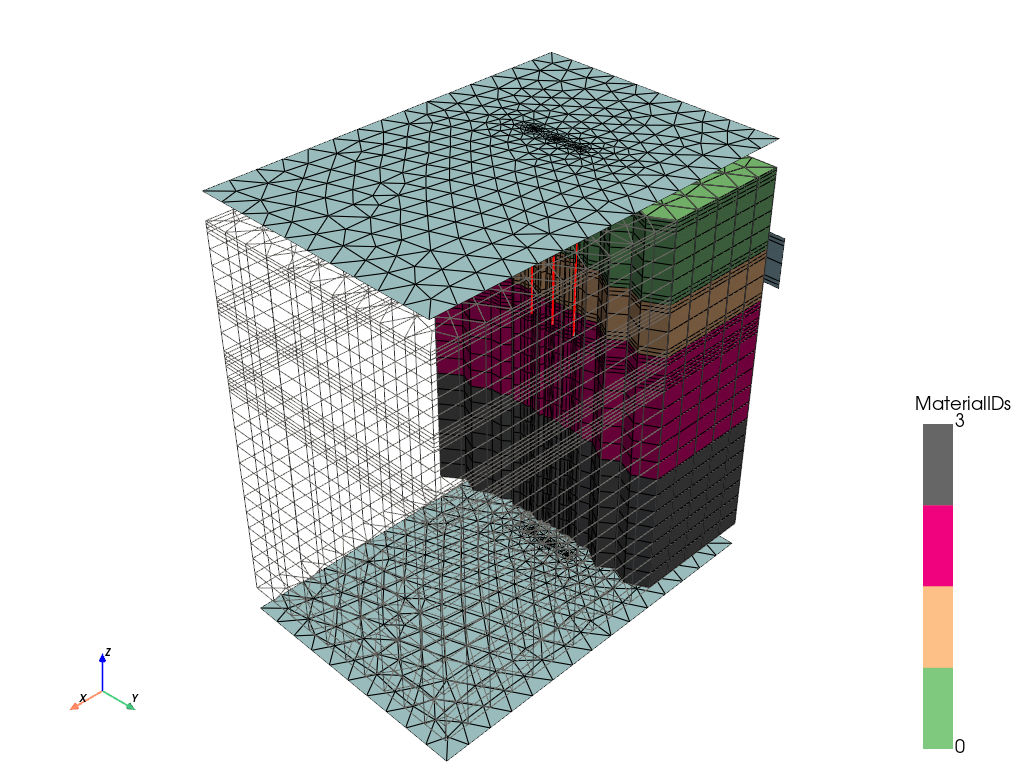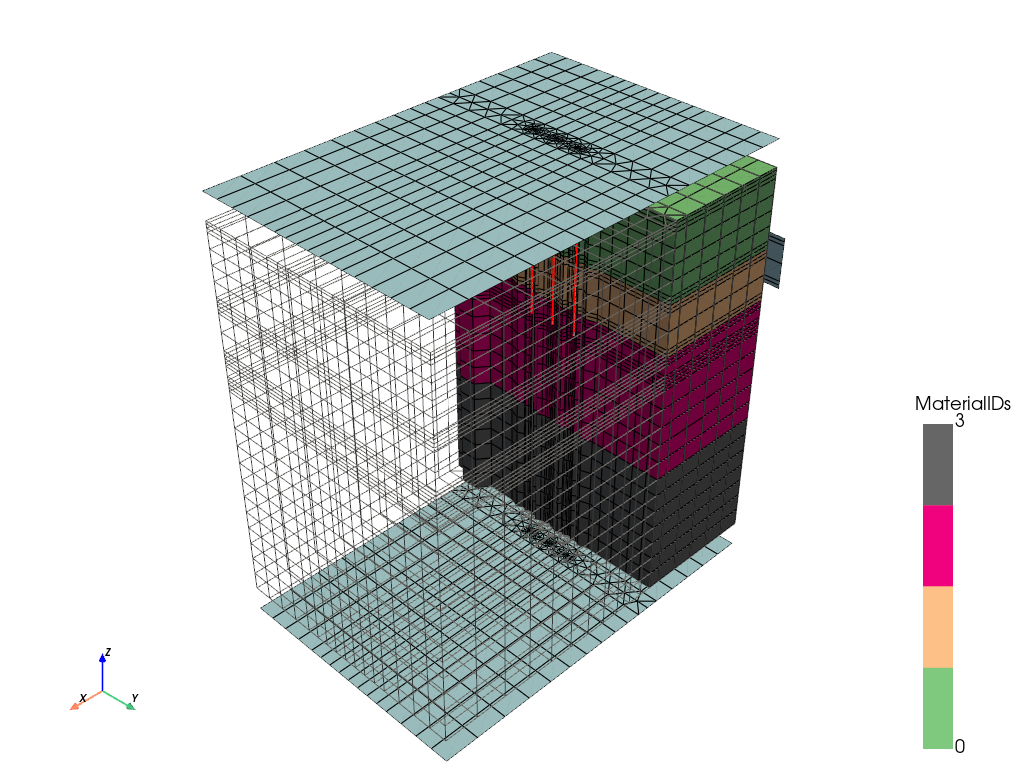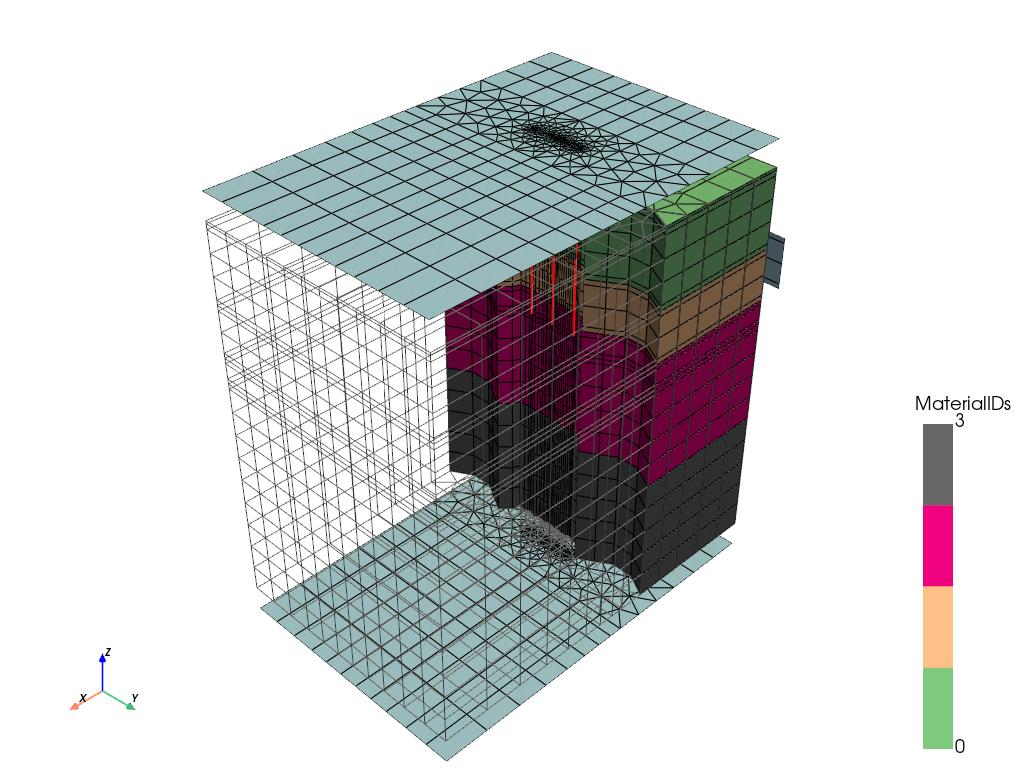Note
Go to the end to download the full example code. or to run this example in your browser via Binder
Creating a BHE mesh (Borehole Heat Exchanger)#
This example demonstrates how to use ogstools.meshlib.gmsh_BHE.gen_bhe_mesh to create
a Borehole Heat Exchanger (BHE) mesh.
import pyvista as pv
from shapely import Polygon
import ogstools as ot
from ogstools.meshlib.gmsh_BHE import BHE, Groundwater, gen_bhe_mesh
Introduction#
This example shows the general usage of ogstools.meshlib.gmsh_BHE.gen_bhe_mesh and how some of
the parameters will effect the mesh. This section demonstrates the mesh
generation with only three soil layers, groundwater flow in one layer
and three BHE’s. However, this tool provides multiple soil layers,
groundwater flow in multiple layers and multiple BHE’s. The mesh sizes
provides good initial values for the most Heat-Transport-BHE simulations
in OGS. They can also be set by the user, to customize the mesh.
Feel free to try it out!
Create a simple prism mesh#
Generate a customizable prism BHE mesh:
bhe_meshes = gen_bhe_mesh(
model_area=Polygon.from_bounds(xmin=0, ymin=0, xmax=150, ymax=100),
layer=[50, 50, 50],
groundwater=Groundwater(
begin=-30,
isolation_layer_id=1,
upstream=(179, 181),
downstream=(359, 1),
),
BHE_Array=[
BHE(x=50, y=40, z_begin=-1, z_end=-60, borehole_radius=0.076),
BHE(x=50, y=50, z_begin=-1, z_end=-60, borehole_radius=0.076),
BHE(x=50, y=60, z_begin=-1, z_end=-60, borehole_radius=0.076),
],
refinement_area=Polygon.from_bounds(xmin=40, ymin=30, xmax=60, ymax=70),
meshing_type="prism",
meshname="bhe_prism",
)
Load the domain mesh and all submeshes, extract the BHE lines and visualize it all:
def load_and_plot(bhe_meshes: ot.Meshes):
bhe_line = bhe_meshes.domain().extract_cells_by_type(pv.CellType.LINE)
offsets = [(0, 0, 10), (0, 0, -10), (10, 0, 0), (-10, 0, 0)]
plotter = ot.plot.contourf(
bhe_meshes.domain().clip("x", bhe_line.center, crinkle=True),
ot.variables.material_id,
)
plotter.add_mesh(bhe_meshes.domain(), style="wireframe", color="grey")
plotter.add_mesh(bhe_line, color="r", line_width=3)
for submesh, offset in zip(
bhe_meshes.subdomains().values(), offsets, strict=True
):
plotter.add_mesh(
submesh.translate(offset), show_edges=True, color="lightgrey"
)
plotter.show()
load_and_plot(bhe_meshes)

Create a simple structured mesh#
Generate a customizable structured BHE mesh:
bhe_meshes = gen_bhe_mesh(
model_area=Polygon.from_bounds(xmin=0, ymin=0, xmax=150, ymax=100),
layer=[50, 50, 50],
groundwater=Groundwater(
begin=-30,
isolation_layer_id=1,
upstream=(179, 181),
downstream=(359, 1),
),
BHE_Array=[
BHE(x=50, y=40, z_begin=-1, z_end=-60, borehole_radius=0.076),
BHE(x=50, y=50, z_begin=-1, z_end=-60, borehole_radius=0.076),
BHE(x=50, y=60, z_begin=-1, z_end=-60, borehole_radius=0.076),
],
refinement_area=Polygon.from_bounds(xmin=40, ymin=30, xmax=60, ymax=70),
meshing_type="structured",
meshname="bhe_prism_2",
)
Load the domain mesh and all submeshes as well as extract the BHE lines:
load_and_plot(bhe_meshes)

Create an advanced structured mesh#
Generate a customizable structured BHE mesh with advanced mesh sizing options (using gmsh). By adding additional points to the model_area, the subdivison of the surface by the structured mesh algorithm is controlled. To understand the specific behaviour of every mesh parameter, test each one after another.
bhe_meshes = gen_bhe_mesh(
# add additional points for better subsidivision of the surface by structured algorithm
# compare with previous example, to see the difference
model_area=Polygon(
(
(0.0, 0.0),
(40.0, 0.0),
(60.0, 0.0),
(150.0, 0.0),
(150.0, 100.0),
(60.0, 100.0),
(40.0, 100.0),
(0.0, 100.0),
)
),
layer=[50, 50, 50],
groundwater=Groundwater(
begin=-30,
isolation_layer_id=1,
upstream=(179, 181),
downstream=(359, 1),
),
BHE_Array=[
BHE(50, 40, -1, -60, 0.076),
BHE(50, 50, -1, -60, 0.076),
BHE(50, 60, -1, -60, 0.076),
],
refinement_area=Polygon.from_bounds(xmin=40, ymin=30, xmax=60, ymax=70),
meshing_type="structured",
target_z_size_coarse=10, # default value 7.5
target_z_size_fine=2, # default value 1.5
n_refinement_layers=1, # default value 2
propagation=1.2, # default value 1.1
inner_mesh_size=8, # default value 5
outer_mesh_size=12, # default value 10
meshname="bhe_structured",
)
Load the domain mesh and all submeshes as well as extract the BHE lines:
load_and_plot(bhe_meshes)

Total running time of the script: (0 minutes 45.505 seconds)

